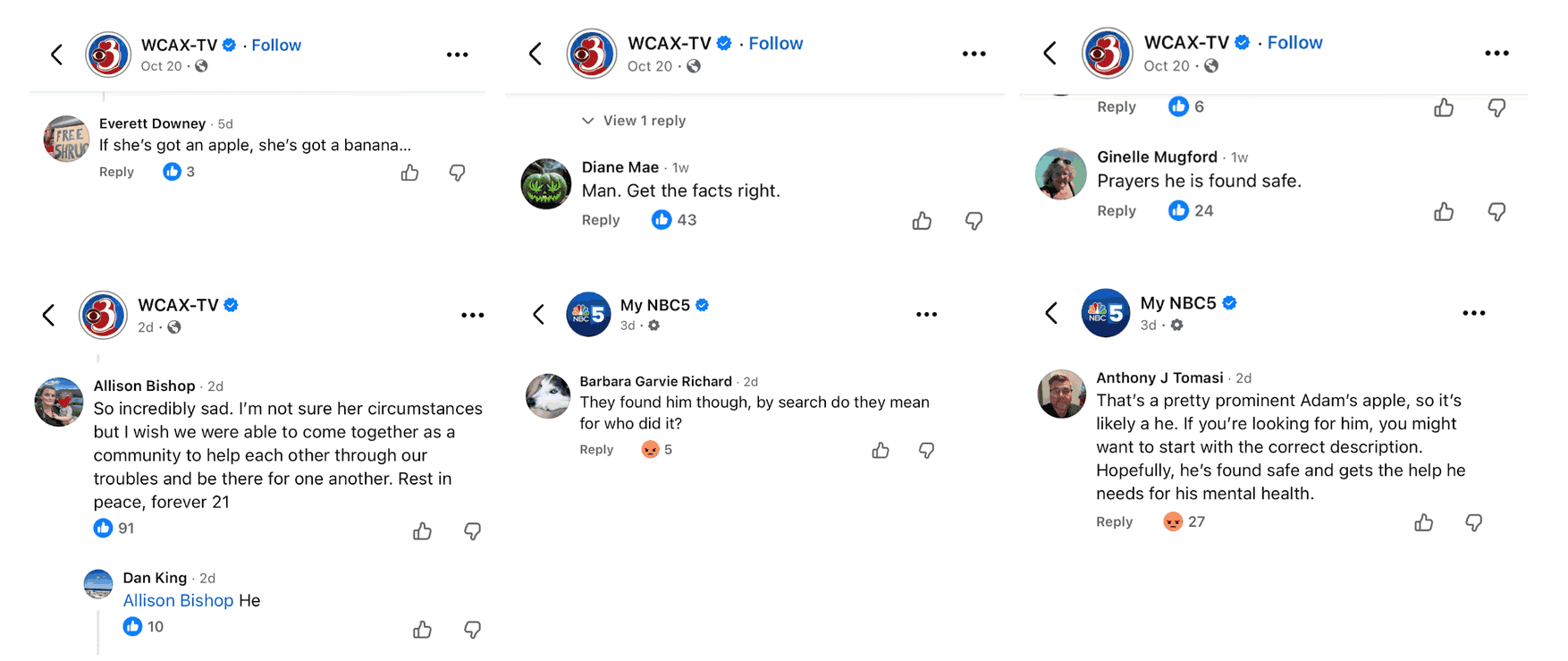This short series, Middlebury College is Failing its Transgender Students, is separated into three parts. Part 1 is below. Part 2 can be read here. Part 3 can be read here.
On October 19, Middlebury College student Lia Smith was reported missing, a week after the town of Middlebury celebrated its fourth annual Pride celebration. Four days later, she was found dead. Smith was a trans woman and former student-athlete who, in the face of growing state repression towards trans women, faced a barrage of transphobia and isolation not only from online harassment and transmisogyny, but also on the Middlebury campus itself. Nine months before her death, the college chose to comply with an NCAA ruling based on President Trump’s executive order that banned trans women from official competition. Meanwhile, the school continued to allow far-right campus groups to amplify bigotry and transphobia through the speakers they platformed. Under this backdrop, Smith’s mental health deteriorated, and she took her own life.
A Swimmer and Trans Advocate on Campus
Lia Smith was a 21-year-old student from Berkeley, California, pursuing a double-major in Statistics and Computer Science. She was a member of the chess club, Japanese club, an outspoken campus advocate for trans rights, and a member of the women’s swimming and diving team. In her first year, Smith was a strong diver, achieving an NCAA “B” cut for her performance.
Smith was well-liked by her teammates and peers on campus, and some parents shared this, memorializing Smith on Middlebury College’s Facebook page. One parent said, “Lia was an amazing friend to our daughter, and an incredible human.” Another said, “Lia was a member of my daughter’s swim family. I asked her what she would remember most about Lia. She didn’t hesitate…her wicked sense of humor, gosh she could make me laugh.”
During her diving career, Smith faced relentless harassment and targeted attacks for her gender identity. Smith took a break from diving during her sophomore year and returned to the team in the fall of 2024. Anti-trans sentiment and harassment reached a crescendo around the time of the NCAA ban, and Smith’s athletic profile page was removed from the college’s website. Laurie Essig, a professor of Gender, Sexuality, and Feminist Studies who knew Smith through the Queer Studies academic interest house, said that Smith was not removed from the team. However, no one knows why Smith’s academic page was taken down. It may have been at her own request, to avoid being harassed and doxxed, or it may have been done by the athletic department to hide her existence on the team.
Simply being listed on the roster put Smith’s safety at risk, and on campus, she was forced to defend her own existence and humanity. In February, just two weeks after her information was scrubbed from the athletics website, the college platformed a “debate” on limiting gender-affirming healthcare for trans people. The event was sponsored by the Alexander Hamilton Forum, which has a long history of platforming white supremacist, homophobic, and far-right extremists.
Debating the Basic Humanity of Transgender People
The event, titled “What is the Right Approach on Public Policy and Transgender Medicine?” featured speakers Brianna Wu and Leor Sapir, with behind-the-scenes support from campus Republicans. Gary Winslett, a political science professor and Director of the Alexander Hamilton Forum, organized and moderated the event.
The Hamilton Forum is a Koch-funded “think tank,” and has been celebrated by groups like the Heritage Foundation, whose Project 2025 has aggressively attacked trans and gender non-conforming people. Beyond rejecting claims that platforming hatred is a laudable vehicle for “free speech,” critics like Essig wonder why the Hamilton Forum continues to take money from sources that, in her words, “have been known to undermine democracy at every turn.”
Winslett told local news his goal for the event was to “educate” students by exposing them to “these different viewpoints that are out in the world,” adding that students need the ability to hear from other viewpoints outside of “the progressive orthodoxy on our campus.” According to Essig, Winslett never reached out to her or anyone from her department about the event, which she described as a “setup” to introduce anti-trans views to campus under the guise of a “debate” between two individuals who were not trusted experts in the field.
Wu, a trans woman accused of conservative grifting and a staple in far-right media spaces, has regularly attacked other trans women, falsely claimed puberty blockers were child abuse, and made numerous bigoted statements about non-binary people. Wu has been a very vocal opponent of trans women in women’s locker rooms and women’s sports, giving ammunition to far-right transphobia.
Leor Sapir, the more extreme of the two speakers, is a former IDF soldier with a political science PhD from Boston College. His Joe Rogan-esque “skepticism” has led him to publish misinformation and pseudoscience against puberty blockers and practically all gender-affirming care for trans youth, to attack trans women in sports, including former Penn swimmer Lia Thomas, and to celebrate Trump’s recent attacks on trans youth and adults. At the event, Sapir asserted that allowing gender affirming care would make it harder to distinguish “future transsexuals” from “proto-gay boys.” This claim, that gay and lesbian children are being “turned” trans, is a common argument made by transphobes and has long been debunked.
In October, Middlebury College Republicans mentioned in a letter to the editor for the school’s student paper, The Middlebury Campus, that they had special access to Sapir and Wu, meeting with them before the event and even having dinner with them afterwards, affirming criticism by protestors of the clear bias and ideological intent of the “debate.”
When The Rake asked Wu if she had reached out to trans and non-binary Middlebury students before the event, she responded that she did not have to “reach out to others for permission to speak and defend [her] own rights.” When asked what impact Wu’s position against trans women in sports may have had on Smith, Wu dodged the question. Several days later, Wu publicly apologized for compromising with far-right transphobes over the last two years, then proceeded to continue making transphobic comments.
While Wu and Sapir debated, Smith held a counter-event titled Trans Healthcare is NOT a Debate. The event included a panel with Smith and Essig. During the event, Smith talked about how much harder it was becoming to be a trans woman and athlete, saying, “There’s been a shift, and as much as trans athletes were disliked before, now it’s definitely coming back to the forefront again.”
Smith went on to discuss all the extra hoops she had to jump through to dive, such as getting her blood and hormones tested every three months, and that this pressure, along with increasingly hateful and dehumanizing anti-trans rhetoric, led her to take a break from the team her sophomore year.
The counter event underscored the Middlebury administration’s ongoing failure to support LGBTQ+ students, as it was primarily trans and queer students who organized it. “They did an amazing job, and it was a beautiful event,” Essig told The Rake. “But it’s like, why are we outsourcing protecting trans students to other trans students?”
For Essig, the administration’s inaction in the current climate deepens an already hostile environment. She mentioned resources like Middlebury’s Prism Center, Feminist Resource Center, and Queer Studies House, but questioned their role in the broader context. “It feels a lot like woke washing for what is, in fact, a very hostile environment,” she said, “hostile particularly because it refuses to admit that we’re in the middle of a global anti-gender movement that is targeting your very existence.”
What is it Like to be Transgender in Vermont and on Middlebury’s Campus?
A 2024 Trevor Project survey of Vermont LGBTQ+ youth aged 13-24 shows that LGBTQ+ youth are already exposed to transphobic viewpoints and politics, as an overwhelming 95% of LGBTQ+ youth said that recent politics has sometimes or often negatively impacted their well-being, calling into question Winslett’s assertion that students need to be exposed to these viewpoints.
The Trevor Project survey illustrates the impact local, national, and international transphobia has on the mental health and safety of young queer and trans Vermonters. While 80% of trans and nonbinary youth say their local community is welcoming to them, only 60% say that school is an affirming space, and a lack of safety in these spaces has led 20% of their families to consider leaving Vermont for a more affirming state. The data on declining mental health for gender-nonconforming Vermonters is even more startling: Nearly 70% of trans and nonbinary youth have anxiety and/or depression, 50% have seriously considered suicide in the last year, with 16% attempting to follow through.
Trans and nonbinary college students, who once found a level of safety and acceptance at universities across the country, are facing an onslaught of isolation, harassment, and fear as institutions in every state bend to the Trump administration’s fascist war on gender-nonconformity and queer existence. While students in conservative states like Texas and Florida may be feeling the worst of it, Vermont is not immune to state and college leaders caving to the Trump administration. At Middlebury, in particular, the rural campus can make marginalized students feel even more isolated.
One former student and trans woman at Middlebury, “X,” who asked that her name not be published for fear of online harassment and retaliation, shared her own experiences on campus with The Rake, along with why she believes two students who were trans women have died on campus in under two years.
“All evidence suggests that Middlebury is a particularly dangerous place for trans students,” she said. “Middlebury is not just a normal place where normal bad things happen to trans women. It is a place where bad things happen to marginalized students at a disproportionate rate.”
The sort of vitriol trans women face online, amplified by local legacy and independent news organizations that refuse to invest in moderating their social media pages, can amplify feelings of hopelessness. These unregulated comment sections serve as a meeting place for fascists to dehumanize and incite hatred against marginalized groups. For trans and non-binary Vermonters, including Middlebury students, this hostility shows up daily at their fingertips.
Smith’s suicide was no exception. On WCAX, MyNBC5, and ABC22/FOX44’s social media pages, Smith was constantly misgendered, and her body was talked about in misogynistic and dehumanizing ways well known to trans women, who have to see or hear comments like these daily.

The Growing anti-“Gender Ideology” Movement Comes to Roost
Professor Essig, a renowned expert on feminism and fascism, recognized that, as anti-“gender ideology” movements grow across the globe–in Hungary, India, Mexico, Russia, and even in Florida and Texas–it will be important to learn from resistance movements throughout the world. A couple of years ago, Essig began a podcast, Feminism, Fascism, and the Future, to explore this anti-gender and anti-trans movement locally.
This movement attacks queer and trans people by denying the reality of a multiplicity of genders, gender expression, sexual expression, and “biological” sex. Its adherents believe that these queer and trans people are corrupting children and destroying the future, and therefore the state must use authoritarian violence and oppression to protect (cishet white) women and children from it.
Essig taught gender studies in the 2010s in Russia, where President Vladimir Putin focused his authoritarianism on anti-gay repression, using gay people as scapegoats for a disappearing democracy and an anemic economy. Putin passed anti-gay propaganda laws, such as banning gay marriage and banning any public recognition of gay people. In Russia today, having an LGBTQ+ pride pin on your jacket could result in a maximum twelve-year prison sentence.
The way that anti-“gender ideology” fascist groups organize today is not that different from previous fascist iterations: only their main threat has changed. In Nazi Germany, the internal enemy was Jewish people, while in the U.S., trans women and trans femmes are viewed by the fascist far-right as internal threats that need to be eliminated.
This war is far-reaching and is being felt throughout the country. Essig explained how, just like in Hungary and Russia, gender studies programs are being shuttered at colleges and universities big and small, public and private, across the U.S. This oppression came roaring to Middlebury College’s front door in February 2025.
In recent years, Middlebury College has failed its students’ mental health, and the failure is multifold for BIPOC and transgender students. Including Smith, six students have died by suicide or from an overdose in the last five years. In 2020, William Nash died after a bad reaction to drug use. In 2021, international student Yan Zhou died by suicide. In 2023, Ivan Valerio, a young queer Filipino-American, also died by suicide. The situation has become so dire that the graduating class of 2024’s senior gift was a donation to campus mental health funding.
In October, the campus paper’s editorial board wrote an op-ed on the slew of student suicides, in which they shared how the administration’s offer of increased mental health support for LGBTQ+ students in the wake of the overdose of Evelyn Mae Sorensen in 2023 was insufficient. The board wrote, “We call for an urgent and new approach to supporting LGBTQ+ students at the school. In a rural institution like ours, it is far too easy for students to feel lost and unseen. It is not enough to…point to the mere existence of on-campus centers such as the Prism Center as complete solutions.”
X, the former Middlebury student, echoed this sentiment, telling The Rake that “one building is not enough. I can’t believe I have to say that.”
Update 11/21/2025: We have updated the piece to reflect that Smith only competed as a diver and not as a swimmer.
Update 11/19/2025: We have updated the piece to reflect that there is no consensus on why Smith’s athletic page was removed from the website, only that it was removed around the time of the NCAA anti-trans ban.



